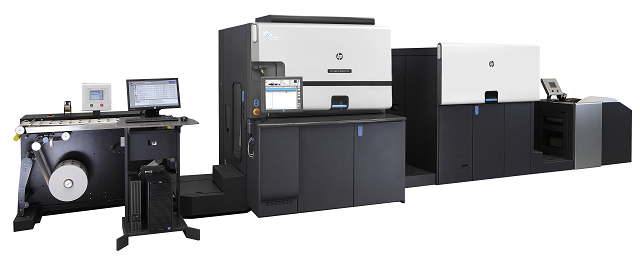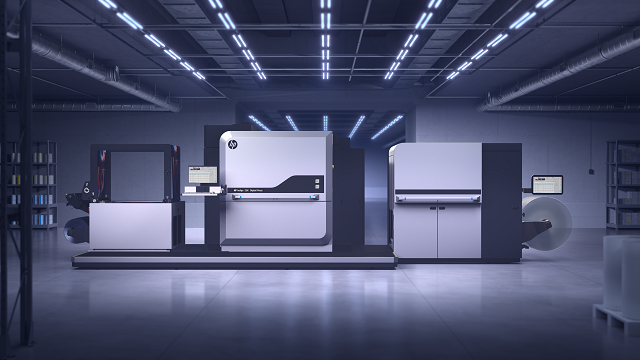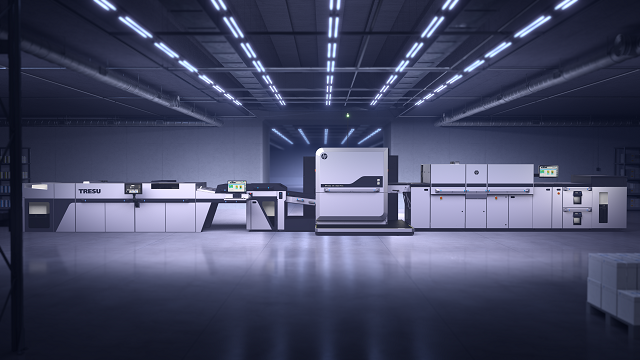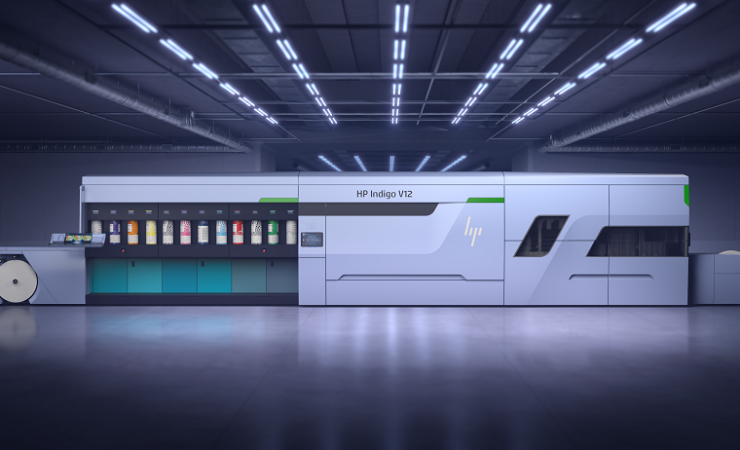HP Indigo has developed an upgraded fleet of digital presses for label and package printing, designed to improve the capability and efficiency of companies utilising its LEP technology.
Building on the success of its Series 4 machines, the portfolio of Series 5 presses are designed to enhance the ability of its digital press users to meet and exceed current and future market drivers, such as time to market, the rise in craft, shelf appeal, brand protection and sustainability.
In labels, this has seen the 6K (below) digital press launched, an upgrade on the 6900, which itself was an upgrade on the WS6800. The press can deliver more applications using higher opacity white for shrink sleeves, new inks including silver, fluorescents, invisible red and green for brand protection applications, and new varnishes from industry partners that offer enhanced mechanical durability and improve the characteristics of those labels produced using the Pack Ready for Labels ecosystem.

The HP Indigo 6K is the latest iteration of the company’s 6X00 series of digital label presses
Similar additions have been made to the new and improved 8000 digital press, launching as the HP Indigo 8K. This offers increased productivity, reduced waste, and easier transitioning between media types and jobs.
The HP Indigo 8000 was introduced as a means to enhance the effective throughput of Series 3 label presses by combining two HP Indigo WS6800 digital presses inline. This allowed for a print speed of 80m/min.
To further this and meet the market’s repeated requests for higher speeds, HP Indigo has developed V12 (pictured, top), an entirely new digital printing platform based on LEP, as LEPx.
This uses an inline print architecture as opposed to the usual central impression (CI) design within HP Indigo digital presses, with a blanket belt allowing up to 12 colours to be printed at 1600dpi at a width of 340mm, and with a 5.33m repeat length. Six print stations, each with a writing head and two BID (binary ink developer) units, equates to the 12 colours. This requires the blanket belt to rotate twice for 12 colours to be laid down using HP’s proprietary one-shot process and the full image to be accumulated prior to transferring to the substrate, whether paper or film. This results in a speed of 60m/min (200ft/min). When only six colours are used, and a single rotation of the blanket belt is required, a maximum print speed of 120m/min (400ft/min) can be achieved. A 1600dpi resolution means HD capability, suitable for security printing and small fonts. A specially developed system design and interface means a single operator can run the press to produce up to 130,000 linear metres in one day.
V12 uses the same HP Indigo chemistry and physics as before, and the same ElectroInks, although a new 1600dpi LED printhead has been developed, as has a new photoconductor imaging drum and a new blanket belt. One-pass, non-stop high-speed finishing capabilities are to be provided by AB Graphic.
V12 is actually the first Series 6 HP Indigo digital press, and while it will be shown at drupa 2020, HP Indigo general manager Alon Bar-Shany anticipates an extensive development cycle and a prolonged beta period to ensure the machine is suited to the market and its needs, similar to the Series 5 press portfolio that comes eight years after the Series 4 launch at drupa 2012. V12 is intended to become commercially available in 2022.
Mr Bar-Shany noted V12 as complementing the company’s existing label presses as it is not geared up to handle short runs, rather to open digital printing and HP Indigo’s technology up to a larger section of the label printing market, with more jobs able to be transitioned from flexo to digital owing to a ‘significantly higher’ breakeven point. He even spoke of some customers looking into a bridge strategy that will see them invest in an HP Indigo 8000 or similar high productivity system to build up capacity before bringing a V12 online.
V12 is initially being pitched at the digital label printing market, although as customers respond to its launch and the technology is developed, the application range will likely be extended.
This fits in with HP Indigo’s previous efforts to grow its customers’ ability to diversify and win new business, as was evidenced through its Series 4 presses. Specifically, the HP Indigo 20000 digital press for flexible packaging, which has long since surpassed 200 presses sold, with the likes of ePac Flexible Packaging building successful business models on the technology.

The HP Indigo 25K Series 5 press builds on the success of the Series 4 HP Indigo 20000
This press has now also been upgraded with the new HP Indigo 25K (above). Greater flexibility is afforded with two white ink stations, with higher productivity through a frame expansion from 729mm to 737mm. High-capacity label production and flexible packaging on the HP Indigo 25K are supported with a new slitter making it easier to diversify into ‘new and lucrative applications’. 25K digital presses also fit into the ‘Digital Pouch Factory’ concept, which for less than $3m allows companies to print, laminate and form pouches. This involves the HP Indigo digital print engines, lamination systems from the likes of Enprom, Karlville and Nordmeccanica, and pouch making machines, like the Karlville KS-DSUP-400, as installed at Baker Labels and ePac Flexible Packaging, and also at CS Labels as it seeks to grow its flexible packaging offer based on Xeikon’s dry toner digital printing technology.
The HP Indigo 35K digital press (below) does for the HP Indigo 30000 what the 25K does for the 20000 digital press, although this sheet-fed folding carton press has been more deeply upgraded with a redesigned inline primer and feeder, redesigned paper path, and redesigned Tresu coater, iCoat II, offering better registration and accuracy. The new HP Indigo 90K takes things wider as a B1+ roll-to-sheet digital press with inline water-based/UV coater and sheeter. The 35K and 90K effectively serve verticals such as health and personal care, plastic cards and high-end folding cartons, with increased productivity, a wider application range and extended colour capabilities.

The HP Indigo 35K is a re-engineered sheet-fed folding carton platform
All of these mechanical developments are supported by software enhancements and improvements in the ecosystem around the press, from finishing and converting systems from the likes of Prati, Kurz and AB Graphic, to workflow and colour management tools from Esko and X-Rite. One of these, Spot Master, is next-generation colour automation technology designed to enable converters to reach brand colours within minutes. This utilises a combination of Cloud-based workflow and on-press technologies to define, reach, calibrate, keep and report spot colours. Spot Master enables <1 delta E to be reached in three minutes with less than three metres of waste. Spot Master is available for the HP Indigo 35K, HP Indigo 25K, HP Indigo 6K and HP Indigo 8K digital presses.
HP Indigo is also working with the supply chain to develop recyclable and compostable options, particularly in the realm of flexible packaging. Sustainability credentials include the Green Leaf mark and certification from TUV Austria’s ‘OK Compost’ verifying that HP Indigo ElectroInks can be used as printing inks for packaging, and are recoverable through composting and biodegradation in accordance with leading standards. In addition, HP Indigo ElectroInks comply with leading food packaging regulations and are free of UV-reactive chemistries. All Indigo presses are also manufactured carbon neutral.
Mr Bar-Shany said, ‘The digital labels and packaging market is growing and evolving as converters move to support market needs for on-demand production, SKU diversification, customisation and printing with reduced waste. Labels and packaging converters using HP Indigo are growing their Indigo volume four times faster than the market and are consistently generating new opportunities. The new labels and packaging portfolio unveiled today is a blueprint for customers to create a digital print factory so they can stay ahead of the curve and deliver a wider range of jobs faster, with less labour, all while keeping the environment top of mind.’
In addition to its label and package printing developments, HP has made a number of developments in the commercial printing space based on LEP and inkjet technology.
These machines and technologies are planned to be part of HP Indigo’s drupa 2020 presence, which you can read all about in the May/June issue of Digital Labels & Packaging; register here to receive the magazine for free


